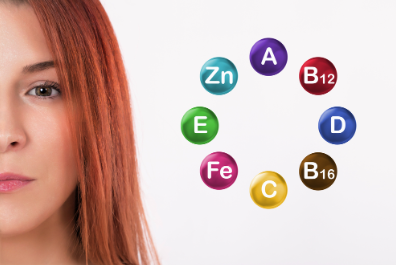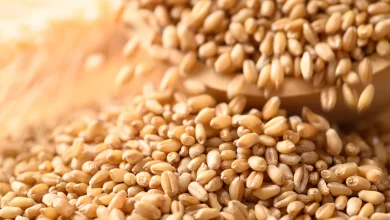Boosting hair growth and thickness with these five vitamins

Losing hair can be a frustrating and emotionally challenging experience for many people, as hair is often closely tied to self-perception and self-confidence. 40% of men experience noticeable hair loss by the age of 35, and 80% by the age of 80, which can feel irreversible. However, some options, such as taking vitamins for hair growth, can help reduce hair loss and even promote regrowth. Genetics, hormones, and ageing can contribute to hair loss, but nutritional deficiencies can also play a role. Vitamin D supplements are also perfect for healthy hair. A healthy diet rich in vitamins, minerals, and other nutrients is essential for maintaining healthy hair. This guide will explore the top 5 vitamins for hair growth and their role in the growth process.
Vitamin A
What is Vitamin A, and why is it important?
As a fat-soluble vitamin, vitamin A is crucial in promoting vision and immunity. These vitamins involve various biological processes, one of which is combating oxidative stress. Oxidative stress occurs when free radicals form in the body, damage cells, tissues, and organs, and can harm hair health.
How does Vitamin A help hair growth?
Vitamin A has strong antioxidant properties making it an excellent vitamin for hair growth. Because of its beneficial effects on the skin, it is often found in skincare products to keep it clean, healthy, and moisturized. Additionally, good blood circulation and moisture are necessary for the scalp. Therefore, Vitamin A is essential for strong, full hair. Studies have shown that a deficiency in Vitamin A can lead to oxidative stress and energy deprivation, which can weaken hair follicles and cause hair shedding. If this deficiency occurs at an early age, it can lead to hair loss at an earlier stage.
B Vitamins
B Vitamins: What are they, and why are they important?
The B vitamin group encompasses several vitamins that promote hair growth, and all B vitamins aid in cell metabolism. The B vitamin complex is a powerful combination of 8 essential vitamins.
How do B Vitamins help hair growth?
The B vitamin family contains several hair growth vitamins, with biotin and niacin being the most important. Biotin, also known as vitamin H, plays a crucial role in protein synthesis, particularly for keratin, a vital protein for strong and thick hair. While it is commonly included in hair, skin, and nail supplements, there is limited scientific evidence to support its effectiveness. A recent study found that 38% of women seeking help for hair loss had biotin deficiency, indicating that biotin may play a vital role in hair loss.
Niacin, which encompasses the B3 vitamin complex, including nicotinic acid and nicotinamide, is involved in various physiological processes such as fat metabolism and hair and skin health. It improves blood flow to the scalp, enhances the barrier properties of the skin, and aids in the removal of waste products. Taking niacin can benefit those with slow hair growth or thinning hair. Additionally, recent studies have shown that long-term topical application of niacin can promote hair growth for women experiencing hair loss.
Vitamin C
What is Vitamin C, and why is it important?
Vitamin C is a widely recognized vitamin that supports hair growth and strength. It is commonly associated with citrus fruits and is best known for its ability to prevent Scurvy, a severe Vitamin C deficiency. This deficiency caused bleeding gums and skin among sailors, but the disease could be prevented once it was discovered. The immune system is strengthened by Vitamin C, a powerful antioxidant.
How does Vitamin C help hair growth?
Vitamin C’s antioxidant properties make it an important vitamin for hair growth. It neutralizes free radicals, which can damage lipids, proteins, and DNA, and is involved in collagen synthesis. Collagen is found in many tissues, including skin, hair, and blood vessels. A deficiency in Vitamin C can affect the formation of the hair shaft, weakening it and can lead to telogen effluvium (hair loss during the resting phase of the hair follicle).
Vitamin D
What is Vitamin D, and why is it important?
The Vitamin D group includes several key vitamins that aid in calcium, magnesium, and phosphorus absorption. These vitamins can be obtained through food and sunlight, as they are synthesized in the skin. The body has a natural equilibrium that prevents an overdose of Vitamin D. This vitamin promotes the normal functioning of the immune system, normal inflammatory response, and muscle function.
How does Vitamin D help hair growth?
Vitamin D plays a key role in maintaining healthy hair and skin. A deficiency in Vitamin D has been linked to hair loss. Studies have shown that the human body has Vitamin D receptors in the skin, which play a crucial role in hair growth. Vitamin D is one of the best vitamins for hair growth. Activation and expression of Vitamin D receptors are thought to promote hair growth. Vitamin D also helps regulate keratinocyte cells, which produce keratin. Studies have suggested that Vitamin D may have the potential as a topical solution for hair loss, but more research is needed to support this. Egyptian scientists found a correlation between low levels of Vitamin D and hair loss in females. They proposed that testing Vitamin D levels could be beneficial in treating hair loss and thinning hair. It is proven by studies that vitamin D supplements for good hair health.
Vitamin E
What is Vitamin E, and why is it important?
Vitamin E is a fat-soluble vitamin made up of various compounds and fractions. The most active compound is alpha tocopherol, a powerful antioxidant that protects cell membranes from damage caused by free radicals. The body also needs Vitamin E to maintain a strong immune system and fight off foreign invaders like bacteria and viruses. Additionally, Vitamin E works together with Vitamin K to produce red blood cells and prevent them from clotting in blood vessels.
Vitamin E has several benefits for hair growth and appearance, primarily due to its antioxidant properties. Oxidative stress is a major factor in hair loss and gray. Vitamin E’s antioxidant properties help combat oxidative stress’s effects on the hair, promoting hair growth and preventing hair loss and greying.
Conclusion
Hair loss and thinning are common concerns for many people worldwide and a significant source of stress and insecurity. 60% of people experiencing hair loss prioritize having more hair over wealth or friendships, highlighting the importance of identifying deficiencies and developing a comprehensive approach to address hair loss. Achieving healthy hair requires a balance of nutrients, understanding which vitamins are beneficial for hair growth, and making lifestyle changes. This combination of efforts can lead to improved hair growth and increased self-confidence. Do visit our website to shop for vitamin D Supplements and vitamins for hair growth.






